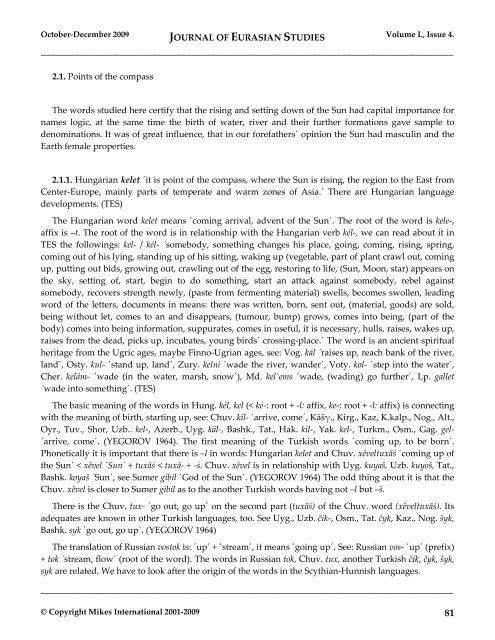JOURNAL OF EURASIAN STUDIES
JOURNAL OF EURASIAN STUDIES
JOURNAL OF EURASIAN STUDIES
You also want an ePaper? Increase the reach of your titles
YUMPU automatically turns print PDFs into web optimized ePapers that Google loves.
October-December 2009 <strong>JOURNAL</strong> <strong>OF</strong> <strong>EURASIAN</strong> <strong>STUDIES</strong> Volume I., Issue 4.<br />
_____________________________________________________________________________________<br />
2.1. Points of the compass<br />
The words studied here certify that the rising and setting down of the Sun had capital importance for<br />
names logic, at the same time the birth of water, river and their further formations gave sample to<br />
denominations. It was of great influence, that in our forefathers´ opinion the Sun had masculin and the<br />
Earth female properties.<br />
2.1.1. Hungarian kelet ´it is point of the compass, where the Sun is rising, the region to the East from<br />
Center-Europe, mainly parts of temperate and warm zones of Asia.´ There are Hungarian language<br />
developments. (TES)<br />
The Hungarian word kelet means ´coming arrival, advent of the Sun´. The root of the word is kele-,<br />
affix is –t. The root of the word is in relationship with the Hungarian verb kél-, we can read about it in<br />
TES the followings: kel- / kél- ´somebody, something changes his place, going, coming, rising, spring,<br />
coming out of his lying, standing up of his sitting, waking up (vegetable, part of plant crawl out, coming<br />
up, putting out bids, growing out, crawling out of the egg, restoring to life, (Sun, Moon, star) appears on<br />
the sky, setting of, start, begin to do something, start an attack against somebody, rebel against<br />
somebody, recovers strength newly, (paste from fermenting material) swells, becomes swollen, leading<br />
word of the letters, documents in means: there was written, born, sent out, (material, goods) are sold,<br />
being without let, comes to an and disappears, (tumour, bump) grows, comes into being, (part of the<br />
body) comes into being information, suppurates, comes in useful, it is necessary, hulls, raises, wakes up,<br />
raises from the dead, picks up, incubates, young birds´ crossing-place.´ The word is an ancient spiritual<br />
heritage from the Ugric ages, maybe Finno-Ugrian ages, see: Vog. kāl ´raises up, reach bank of the river,<br />
land´, Osty. kul- ´stand up, land´, Zury. kelni ´wade the river, wander´, Voty. kol- ´step into the water´,<br />
Cher. keläm- ´wade (in the water, marsh, snow´), Md. kel`ems ´wade, (wading) go further´, Lp. gallet<br />
´wade into something´. (TES)<br />
The basic meaning of the words in Hung. kél, kel (< ké-: root + -l: affix, ke-: root + -l: affix) is connecting<br />
with the meaning of birth, starting up, see: Chuv. kil- ´arrive, come´, Kāšγ., Kirg., Kaz, K.kalp., Nog., Alt.,<br />
Oyr., Tuv., Shor, Uzb.. kel-, Azerb., Uyg. käl-, Bashk., Tat., Hak. kil-, Yak. kel-, Turkm., Osm., Gag. gel-<br />
´arrive, come´. (YEGOROV 1964). The first meaning of the Turkish words ´coming up, to be born´.<br />
Phonetically it is important that there is –l in words: Hungarian kelet and Chuv. xěveltuxăś ´coming up of<br />
the Sun´ < xěvel `Sun` + tuxăś < tuxă- + -ś. Chuv. xěvel is in relationship with Uyg. kuyaš, Uzb. kuyoš, Tat.,<br />
Bashk. koyaš ´Sun´, see Sumer gibil ´God of the Sun´. (YEGOROV 1964) The odd thing about it is that the<br />
Chuv. xěvel is closer to Sumer gibil as to the another Turkish words having not –l but –š.<br />
There is the Chuv. tux- ´go out, go up´ on the second part (tuxăś) of the Chuv. word (xěveltuxăś). Its<br />
adequates are known in other Turkish languages, too. See Uyg., Uzb. čik-, Osm., Tat. čyk, Kaz., Nog. šyk,<br />
Bashk. syk `go out, go up`. (YEGOROV 1964)<br />
The translation of Russian vostok is: ´up´ + ´stream´, it means ´going up´. See: Russian vos- ´up´ (prefix)<br />
+ tok ´stream, flow´ (root of the word). The words in Russian tok, Chuv. tux, another Turkish čik, čyk, šyk,<br />
syk are related. We have to look after the origin of the words in the Scythian-Hunnish languages.<br />
_____________________________________________________________________________________<br />
© Copyright Mikes International 2001-2009 81
















